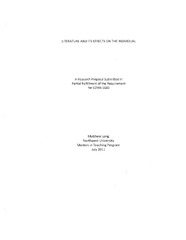Literature and its Effects on the Individual
Abstract
Reading and the study of literature have a seemingly permanent place in all levels of education. Still, the question of why students, or readers of any age for that matter, should read literature has no clear and easy answer. Countless words have been written and research has been conducted on the value and utility of literature. Still, the relevance of reading a given novel or poem is not always easy to explain to students. Literature remains an individual experience, and as such, its more practical qualities and benefits are often less convincing than those found in the study of science or math, for example. Still, few disagree that literature and the other arts hold some type of innate power, and most classify this power as having a moral or societal value. As such, this research project studies the question: what is the ideal role of literature in the individual? To answer the question, this project utilizes a philosophical approach, studying Aristotles Poetics and Plato's The Republic for their thoughts on the role and nature of literature and the other arts. Both attribute literature, or poetry specifically in their case, with significant potential to emotionally impact the audience. They differ greatly, however, in how they think that power should be used. Aristotle ultimately sees this power as good, arguing that poetry can be instructional and help purify readers of negative emotions. Plato argues that poetry can empower these same negative emotions, proving detrimental to the individual and society as a whole. This author ultimately falls more in line with Aristotle's thoughts, arguing that the emotional power of literature and the arts can be of great use if conducted and managed well.
Original item type
PDF
Original extent
2, 1, 35 pages
Subject
Copyright
This original work is protected by copyright. Copyright is retained by the author(s). Works may be viewed, downloaded, or printed, but not reproduced or distributed without author(s) permission.


 Maintained by the Northwest University Library
Maintained by the Northwest University Library